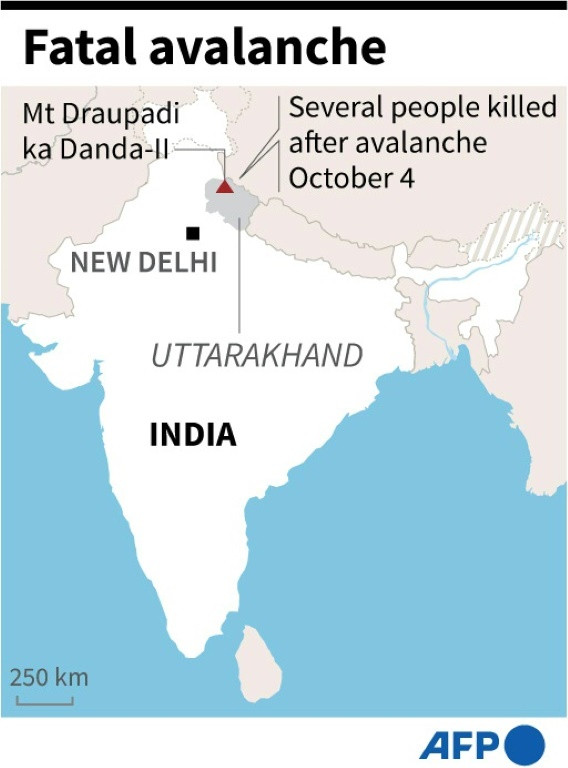Ten Dead After Indian Himalayas Avalanche Hits Climbers

Ten people are confirmed dead after an avalanche struck climbers in the Indian Himalayas, police said Wednesday, with 18 other members of the expedition still missing.
Several dozen climbing trainees were caught in Tuesday morning's snowslide near the summit of Mount Draupadi ka Danda-II in the northern state of Uttarakhand.
The Indian air force and local disaster agency were assisting with rescue efforts before heavy snow and rainfall forced them to abandon the search overnight.
"Rescue teams have recovered 10 bodies," the Uttarakhand state police force said on Twitter after operations resumed in the morning.
Fourteen people have so far been rescued from the site of the avalanche, around 4,900 metres (16,000 feet) above sea level, and police said five were being treated at a district hospital in Uttarkashi.
Police footage showed several rescued climbers arriving in the town and walking unassisted while escorted by officers.
Uttarakhand Chief Minister Pushkar Singh Dhami confirmed on Twitter that accomplished climber Savita Kanswal, who had summited Everest earlier this year, was among the dead.
Kanswal was an instructor with the expedition and had been feted by the climbing community for summiting the world's highest peak and nearby Makalu in just 16 days -- a women's record.
Dhami said the government would provide immediate financial assistance to those injured in the avalanche along with the families of victims.
State disaster agency spokesperson Ridhim Aggarwal told AFP that the climbers had been stuck in a crevasse after the avalanche hit.
The Nehru Institute of Mountaineering said the expedition included 34 of its trainees, seven instructors and a nursing assistant.
Two air force helicopters had been sent to the region to assist with the search, senior disaster management official Devendra Singh Patwal told AFP.
Fatal climbing accidents are common on the treacherous terrain of the Himalayas, home to Everest and several of the world's highest peaks.
In August, the body of a mountaineer was recovered two months after he fell into a crevasse while crossing a glacier in the neighbouring state of Himachal Pradesh.
And last week, renowned US ski mountaineer Hilaree Nelson's body was found on the slopes of Nepal's Manaslu peak after she went missing skiing down the world's eighth-highest mountain.
On the day of Nelson's accident, an avalanche hit on the 8,163-metre (26,781-foot) mountain, killing Nepali climber Anup Rai and injuring a dozen others who were later rescued.
Although no substantial research has been done on the impacts of climate change on mountaineering risks in the Himalayas, climbers have reported crevasses widening, running water on previously snowy slopes, and the increasing formation of glacial lakes.

© Copyright AFP 2024. All rights reserved.











